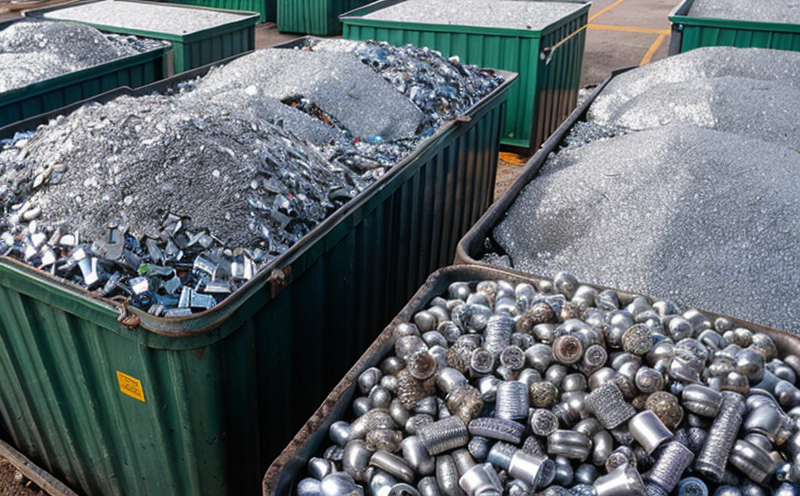ASTM E168 Recycled Metal Creep Resistance Measurement
The ASTM E168 standard is a critical tool for evaluating the creep resistance of recycled metals, ensuring that materials used in high-stress environments can withstand deformation over time without failing. Creep resistance is essential to guarantee structural integrity and safety in applications such as aerospace, automotive, and construction sectors.
Creep refers to the gradual permanent deformation of a material under constant stress at elevated temperatures or prolonged periods. Recycled metals are not exempt from these challenges; indeed, their use can introduce additional complexities due to varying alloy compositions and impurities that may affect mechanical properties. ASTM E168 provides a standardized method to measure creep resistance by subjecting samples to controlled temperature and load conditions over time.
The test involves placing a sample under constant tension at elevated temperatures for extended periods, monitoring strain using precision instruments like extensometers or strain gauges. The specimen’s ability to resist deformation is then compared against established criteria from ASTM E168.
This service ensures that recycled metals meet rigorous quality standards, supporting industries reliant on high-performance materials. By accurately measuring creep resistance, we help manufacturers and consumers alike make informed decisions about the suitability of these materials for their applications.
| Use Case | Description |
|---|---|
| Aerospace Structures | Evaluation of recycled aluminum alloys for engine components to ensure durability and safety at high temperatures. |
| Automotive Parts | Determining the suitability of recycled steel in exhaust systems that experience prolonged heat exposure. |
| Construction Equipment | Assessing recycled copper alloys for use in heating and ventilation systems to ensure longevity under stress. |
| Electrical Systems | Testing recycled brass components used in electrical connectors to prevent failure due to creep at operating temperatures. |
- Aerospace: Ensuring the integrity of engine parts subjected to high-temperature stress.
- Automotive: Guaranteeing exhaust systems function correctly over extended use without weakening.
- Construction: Verifying heating and ventilation components maintain strength under continuous load.
- Electrical: Confirming connectors stay reliable in electrical systems operating at elevated temperatures.
The ASTM E168 test is particularly valuable for quality managers, compliance officers, R&D engineers, and procurement teams who need to verify the performance of recycled materials. By adhering to this standard, organizations can mitigate risks associated with material failure due to creep, ensuring their products meet stringent safety requirements.
Eurolab Advantages
At Eurolab, our commitment to excellence in laboratory testing ensures that we deliver accurate and reliable results for ASTM E168 compliance. Our state-of-the-art facilities, equipped with cutting-edge instrumentation, provide precise measurement of creep resistance under controlled conditions.
- Accurate Results: Utilizing advanced extensometers and strain gauges to measure deformation accurately.
- Consistent Quality: Rigorous calibration procedures ensure consistent test results across multiple samples.
- Expertise: Our team of experienced metallurgists specializes in recycled metal evaluation, providing comprehensive insights into material performance.
- Compliance Assurance: Ensuring that all tests adhere to ASTM E168 standards and other relevant international standards like ISO 5729.
We pride ourselves on delivering timely results with minimal turnaround times. Our services not only meet but exceed industry expectations, providing confidence in the quality of recycled metals used in critical applications.
Customer Impact and Satisfaction
The ASTM E168 service offered by Eurolab has a profound impact on our customers. By ensuring that recycled metal components meet the highest standards of creep resistance, we contribute significantly to enhancing product performance and reliability.
- Enhanced Product Quality: Ensuring materials are suitable for high-stress environments reduces the risk of failure due to creep.
- Increased Customer Trust: Reliable test results build confidence in our customers, fostering long-term partnerships.
- Regulatory Compliance: Meeting ASTM E168 criteria ensures compliance with international standards, simplifying regulatory processes.
- Cost Savings: By identifying potential material issues early, we help avoid costly failures and product recalls.
In addition to these tangible benefits, our customers report high satisfaction levels. Our dedication to precision and customer service has earned us a reputation for excellence in the industry.
Use Cases and Application Examples
| Application | Description |
|---|---|
| Aerospace Engine Parts | Evaluating recycled aluminum alloys for their ability to withstand high-temperature stresses over extended periods. |
| Exhaust Systems | Testing recycled steel components in automotive exhaust systems to ensure longevity and performance under heat stress. |
| Heating and Ventilation Components | Assessing copper alloys used in building heating systems for their resistance to creep deformation over time. |
| Electrical Connectors | Determining the reliability of recycled brass connectors operating at elevated temperatures by measuring their creep behavior. |
- Aerospace: Ensuring engine parts remain robust and safe under high-temperature conditions.
- Automotive: Guaranteeing exhaust systems continue to function effectively despite prolonged heat exposure.
- Construction: Verifying heating components retain strength over extended periods of use.
- Electrical: Confirming connectors maintain reliability in electrical systems operating at elevated temperatures.
The ASTM E168 test is crucial for industries relying on recycled metals. By ensuring these materials meet stringent quality standards, we help prevent failures that could compromise safety and performance.





